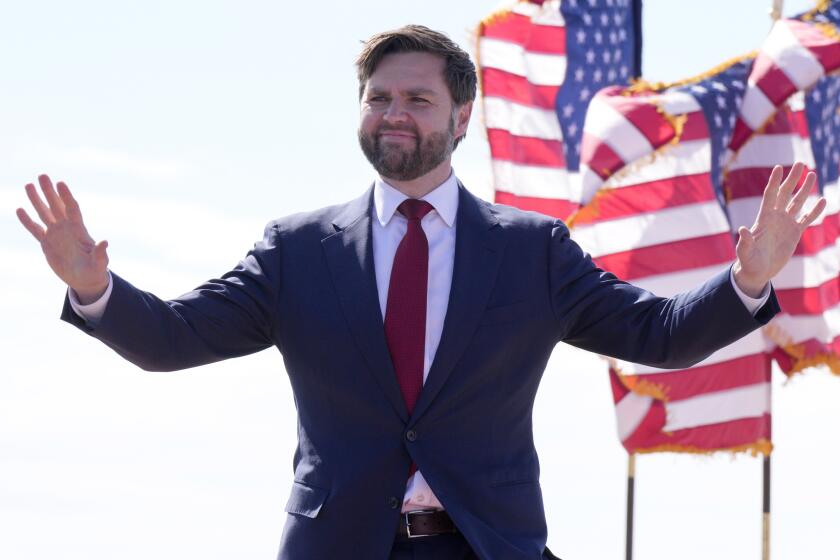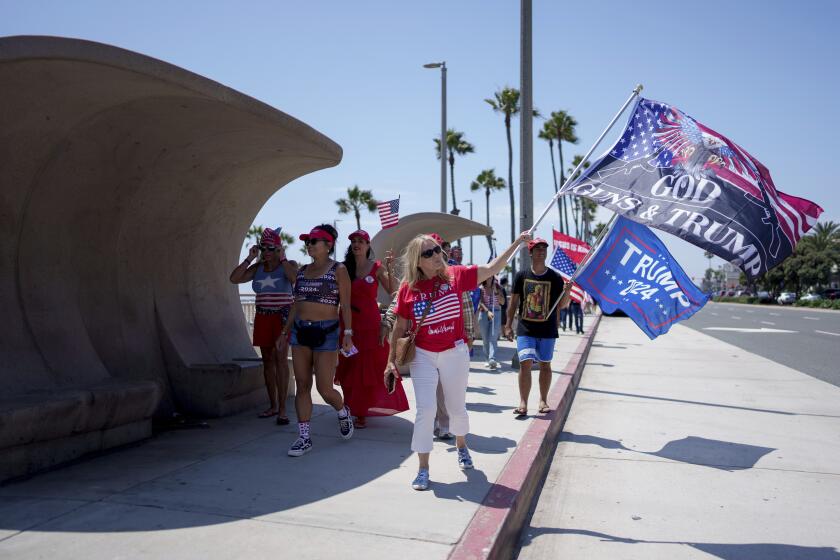Op-Ed: If California’s so liberal, why do we still have money bail?
Since Inauguration Day, anti-Trump resistors nationwide have turned to California as a laboratory for a new liberal democracy. What they don’t realize is that, years ago, somebody broke into our lab and ransacked the equipment, leaving behind one beaker and a microscope with the eyepiece missing.
I’ll give you an example: A majority-minority state with a Democratic lock on the Legislature, California should eagerly volunteer to reform the money bail system. Nearly 450,000 Americans are held in local jails every day — not because of a crime but because they’re too poor to buy their freedom. When we say the names Sandra Bland and Kalief Browder, we should recognize that they died behind bars because they couldn’t afford bail before their trials.
The median bail rate in California is an unconscionable $50,000, out of reach to the disproportionately black and brown population in the criminal justice system. They turn to the $2 billion-a-year bail bond industry, which guarantees trial attendance and takes a 10% cut of the bail price even if the defendant is found innocent.
Two of California’s most prominent national leaders, Congressman Ted Lieu and Sen. Kamala Harris, have introduced federal legislation to end money bail. Dozens of local and national activist groups have organized around the issue in California. It’s a top agenda item for criminal justice reform, which Trump’s arrival sank in Washington. Picking up the slack, Democratic state lawmakers Bob Hertzberg and Rob Bonta introduced legislation this year to base pre-trial release on risk rather than the size of the defendant’s bank account.
It shouldn’t be this hard to roll back injustice in the alleged capital of liberal America.
But while the Senate passed Hertzberg’s SB 10 in June, the Assembly rejected Bonta’s identical bill: Fourteen Democrats voted no, with six others abstaining, killing the legislation by walking away. Then on Friday, we learned that the bill would be put on ice for the rest of the year.
Why?
Fifteen of the 20 Assembly Democrats who either opposed the legislation or cast no votes have received campaign contributions from bail companies or their insurers since the start of 2015, totaling $62,250. The industry also donated $105,000 to the state Democratic Party prior to its convention. The funding muscle comes from the 10 insurance companies that underwrite nearly all bail bondsmen in the country.
The fact of those relatively skimpy donations, however, isn’t a sufficient explanation. You couldn’t buy a single television ad in Los Angeles with the $4,000 each legislator received on average from the bail industry.
To focus only on campaign donations, or even the $309 million spent on corporate lobbying in 2016 (a record eclipsed only by the $314 million the year before), is to miss a bigger factor: the implicit promise of future employment in exchange for playing ball. Artificially short terms create that opportunity.
Special interests can purchase influence on the cheap because of the structure of state politics. Term-limited legislators have only 12 years in the Legislature to make enough of a showing to win higher office or find another line of work. They often wind up rotating into the blob of lobbyists and consultants who outnumber politicians in the state Capitol by 15 to 1. If lawmaking is a hobby, influencing lawmakers is the career.
Among the biggest spenders in Sacramento are local governments, precisely because Proposition 13’s funneling of taxes upstream and other constraints on local control leaves cities at the mercy of the state. When lobbyists warn that it would be too costly for counties to track and remind inmates of court dates, they conveniently neglect the giant price tag for warehousing inmates who cannot afford bail. In fact, Santa Clara, the one California county with a pre-trial release system in place, estimates saving $265,000 a day in incarceration costs.
The constant churn of inexperienced legislators through Sacramento allows the blob to dominate. Lobbyists simply know more about state government than those who make the laws, and they shape that knowledge to serve their interests. The state Chamber of Commerce annually labels “job killer” bills that almost never become law after they land on the list.
And if Californians want to hold lawmakers responsible for succumbing to big business, they run into an electoral system that structurally protects incumbents. Oversized legislative districts disconnect lawmakers from the public and make organizing nearly impossible without giant sums of cash. The top-two primary system denies party rank-and-file the ability to select their preferred candidate. Lawmakers can follow the money instead of their constituents, without fear of reprisal.
A larger, more experienced Legislature, an electoral system that encourages accountability and a constitution not beaten to submission by ballot-box budgeting would create a foundation for state politics that reflect the popular will. Instead, we must move mountains to end the horrors of money bail on vulnerable populations, while Kentucky — Kentucky! — has taken the national lead on pre-trial release without lockups with excellent results.
Even though Hertzberg modified SB 10 to allay his colleagues’ concerns, including building in a two-year ramp-up and giving judges maximum discretion in setting bail, the bill will not see the Assembly floor this year. Gov. Jerry Brown announced Friday that he would work with the bill sponsors and the chief justice of the state Supreme Court to “reform the system in a cost-effective and fair manner,” freeing the Assembly from a showdown vote. The finished product won’t be unveiled until 2018. Brown’s statement included buzzwords like “public safety” and “rights of the accused,” precisely the talking points of the bail industry, which suggests the governor is buying time to water down the reform further.
This means that, despite high-profile support, despite documented inequities for thousands of vulnerable and mostly minority Californians, we’re going to have to wait at least another year for bail reform. It shouldn’t be this hard to roll back injustice in the alleged capital of liberal America.
David Dayen contributes to the Nation, the Intercept and the New Republic.
Follow the Opinion section on Twitter @latimesopinion or Facebook
UPDATES:
2:45 p.m.: This article was updated with details of Friday’s decision by Gov. Jerry Brown to put a plan for overhauling the bail system on hold.
This article was originally published at 2 a.m.
More to Read
A cure for the common opinion
Get thought-provoking perspectives with our weekly newsletter.
You may occasionally receive promotional content from the Los Angeles Times.






